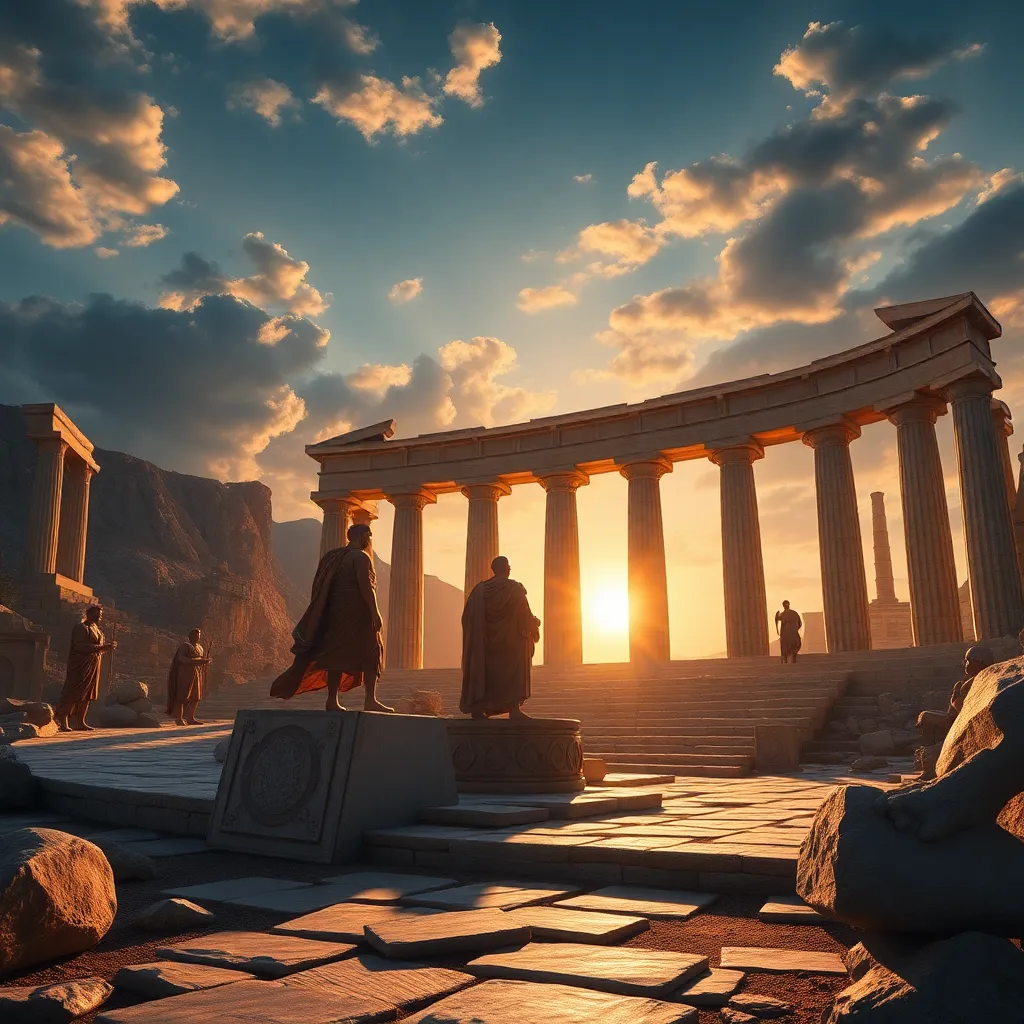The Iliad’s Exploration of the Concept of Legacy
I. Introduction
The concept of legacy in the context of The Iliad refers to the lasting impact and memory that individuals leave behind after their deaths. In ancient Greek culture, legacy was synonymous with honor, reputation, and the stories told about one’s life and deeds. These narratives held significant weight, influencing how individuals were remembered by future generations. The Iliad, as a cornerstone of Greek literature, intricately weaves the theme of legacy throughout its narrative, exploring how characters aspire to leave a mark on history amid the chaos of war.
II. The Heroic Code and Personal Legacy
In Homeric society, the heroic code dictated the behaviors and values of its characters, emphasizing the pursuit of honor and glory as paramount. This code shaped the actions and motivations of key characters, such as Achilles and Hector, who strived to achieve greatness and secure their legacies through valor in battle.
- Achilles: Renowned for his unmatched prowess in combat, Achilles seeks to establish his legacy by achieving eternal glory, even at the cost of his own life.
- Hector: As the defender of Troy, Hector embodies the ideals of loyalty and duty, aiming to protect his city while ensuring his name is remembered as a hero.
The relationship between personal honor and legacy is central to the narrative, with characters often facing moral dilemmas that test their commitment to the heroic code. Their choices resonate through time, illustrating the intricate bond between individual actions and their lasting impact.
III. The Role of Fate and the Gods
The influence of divine forces on human legacy is a recurring theme in The Iliad. The gods frequently intervene in mortal affairs, shaping destinies and altering the course of events, which raises questions about free will versus predestination.
- Divine Influence: Characters often find their legacies intertwined with the whims of gods, who may favor or curse them based on personal vendettas or allegiances.
- Fate: The predetermined fates of characters, such as the tragic destiny of Achilles, highlight the tension between striving for personal glory and the inevitability of fate.
This dynamic illustrates how legacy, though pursued actively by individuals, is ultimately shaped by forces beyond their control, complicating the notion of personal achievement.
IV. The Impact of War on Legacy
War serves as a catalyst for both the creation and destruction of legacies in The Iliad. The brutal nature of conflict often alters how individuals are remembered and celebrated.
- Destructive Nature: The violence of war can tarnish reputations, as seen in characters who face ignoble deaths or are forgotten amid the carnage.
- Posthumous Reputation: The concept of being remembered for bravery in battle is prevalent, with warriors like Patroclus and Achilles achieving lasting fame through their heroic acts.
For instance, Achilles’ wrath and eventual return to battle after Patroclus’ death exemplify how the tragedies of war can transform personal legacies, elevating them to a mythic status while simultaneously serving as a cautionary tale about the costs of vengeance and glory.
V. Women and Legacy in The Iliad
While The Iliad predominantly focuses on male warriors and their legacies, female characters also play crucial roles in shaping and reflecting upon the concept of legacy.
- Helen: Often viewed as a catalyst for the war, Helen’s legacy is complex, as she is both celebrated and vilified. Her beauty and actions lead to monumental consequences, intertwining her fate with the war’s legacy.
- Andromache: As Hector’s wife, Andromache represents the human cost of war, mourning the potential loss of her husband and the legacy he leaves for their son.
The contrasting legacies of male and female characters reveal the societal norms of ancient Greece, where women’s roles were often defined by their relationships with men, yet their stories also resonate with themes of love, loss, and resilience.
VI. The Legacy of Friendship and Brotherhood
The bond between Achilles and Patroclus serves as a poignant exploration of friendship and its impact on legacy. Their relationship transcends mere camaraderie, embodying loyalty, love, and sacrifice.
- Loyalty: Patroclus’ decision to don Achilles’ armor and enter the battlefield illustrates the depths of their bond and highlights how loyalty can shape legacies in profound ways.
- Perceptions of Legacy: The death of Patroclus catalyzes Achilles’ transformation, driving him to seek vengeance and ultimately solidifying both their legacies in the annals of history.
This theme emphasizes that relationships, particularly those grounded in loyalty and sacrifice, significantly influence how legacies are perceived and remembered.
VII. The Enduring Nature of Legacy
In The Iliad, the concept of immortality through legacy is a powerful theme. Characters strive for lasting remembrance, believing that their deeds will preserve their names beyond death.
- Stories and Memories: The oral tradition ensures that the tales of heroes live on, allowing their legacies to be celebrated and remembered by future generations.
- The Poem’s Legacy: The Iliad itself stands as a testament to the enduring nature of legacy, influencing literature and culture for centuries.
This exploration of legacy reflects humanity’s desire to transcend mortality, reminding readers that while life may be fleeting, the stories we tell can achieve a form of immortality.
VIII. Conclusion
In summary, The Iliad intricately weaves the theme of legacy through its narrative, exploring the heroic code, divine influence, the impact of war, and the complexities of relationships. The reflections on legacy remain relevant in contemporary society, where the pursuit of honor and the desire to be remembered continue to resonate. Homer’s exploration of legacy serves as a timeless reminder of the power of actions and relationships, shaping how individuals are remembered long after they are gone.




